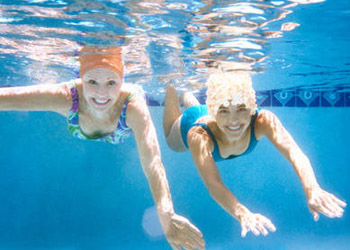
SWIMMING
游泳
A study of 500 swimmers found 66 per cent of them had damaged teeth as a result of chlorine.
一項(xiàng)由500名游泳愛(ài)好者參與的研究發(fā)現(xiàn),其中66%的人牙齒會(huì)受到氯的侵害。
‘Chlorine affects the pH of the water and makes it acidic, so swallowing it can lead to tooth ¬erosion,’ says a researcher.
研究人員稱:“氯會(huì)改變水的PH值,使之變成酸性,吞咽了這些水會(huì)導(dǎo)致蛀牙。”
‘This can result in yellowing teeth – because the acid strips the enamel and starts to reveal darker-coloured dentine underneath. It is not a ¬common problem, but may be an issue for regular swimmers who spend a long time in the pool each day.’
“此外氯還會(huì)導(dǎo)致一口黃牙,因?yàn)樗嵝晕飼?huì)剝蝕掉釉質(zhì),致使后層顏色較深的牙質(zhì)顯露出來(lái)。盡管這不算是普遍問(wèn)題,但對(duì)于那些每天都泡在游泳池的人來(lái)說(shuō),這個(gè)問(wèn)題不容忽視。”
REDUCE THE RISK: Try to keep your mouth closed while swimming. Don’t brush your teeth straight after your dip because at this time the surface of the teeth could be softened by the acidic chlorine and could be more easily brushed away.
如何補(bǔ)救:游泳時(shí)緊閉嘴唇,游完之后不要立即刷牙,因?yàn)檫@時(shí)牙表面可能正好被酸性的氯軟化了,這樣釉質(zhì)會(huì)被輕易地刷掉。


















